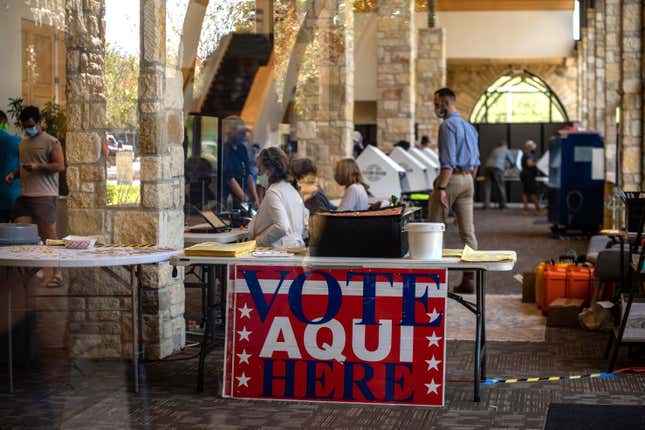
You may remember seeing or reading about Hervis Rogers, a Texan who went viral waiting six hours to cast a ballot at Texas Southern University last March.
Well, here’s a rather disappointing update to his story from NPR: Rogers, who previously served prison time for burglary, was arrested this week for voting before his parole ended in June 2020. Since voting while on parole is illegal in Texas, prosecutors are chalking this up as a “them’s the rules”-type of situation.
The ACLU, on the other hand, thinks the rules are unfair.
From NPR:
Rogers was arrested on Wednesday in the South Acres neighborhood in Houston, and he voted in Harris County, but the AG’s office is prosecuting the case in Montgomery County. Rogers is charged with two counts of illegal voting. His bail is set at $100,000.
Rogers is represented by the ACLU of Texas and Nicole DeBorde Hochglaube.
“Mr. Rogers is being held in jail on an extremely high bail amount that he cannot afford for what amounts to simply attempting to fulfill his civic duty. This is not justice,” said ACLU of Texas legal director Andre Segura.
Because Rogers voted before his parole was scheduled to end, he was likely ineligible to cast a ballot on Election Day, despite being registered to vote, said a spokesperson with the Harris County Attorney’s Office last year.
The Associated Press reports that Segura said Rogers didn’t know he wasn’t eligible to vote. His arrest has drawn comparisons to the case of Crystal Mason, who was also charged and convicted of voting illegally after casting a provisional ballot in 2016 while on federally supervised release. She says she didn’t know she wasn’t eligible, either.
Obviously, something is wrong here–and that’s just putting it lightly. To put it more strongly, these are just more examples of how some GOP-led states continue to uphold unclear laws that ultimately disenfranchise Black voters.
Take it from the numbers: According to the New York Times, the office of Texas Attorney General Ken Paxton said 531 election fraud offenses have been prosecuted in the state since 2004. Further analysis done by the ACLU found that at least 72 percent of voter fraud-related prosecutions since Paxton took office in 2015 have been against Black or Latinx people. To go even further, 45 percent of those cases were against women of color, like Mason.
If Texas doesn’t want people on parole to vote in elections, how hard is it to let them know that they can’t do that? It’s apparently very hard. Lawmakers passed a bill in 2007 that would require the state to properly notify people released from prison on their voting rights and eligibility status, but the bill was vetoed by former Republican governor and Dancing with the Stars reject Rick Perry.
NPR spoke to Nicole D. Porter, the director of advocacy for The Sentencing Project, a criminal justice reform group. She said the cases of Rogers and Mason are prime examples of why it’s important for states like Texas to give people notice of their rights.
More from NPR:
“It seems that this case in particular is an example of Texas officials using their authority to disappear Black residents under a pretext to gain political points with their cronies in their political party in Texas and nationally,” Porter said. “What Paxton, (Texas Gov. Greg) Abbott and others seem to forget is that this is a person who they’re attempting to disappear.”
NPR reports that a similar bill to the 2007 one was filed this week in the state’s house of representatives.
This also comes at a time as Texas lawmakers began discussing a bill that would impose various restrictions on voting eligibility during a special session that began Thursday. It’s all the same stuff. Just a different state.

